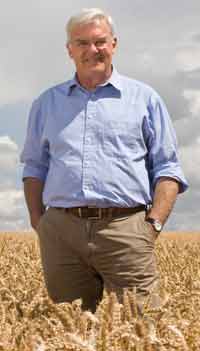FW Awards 2010 winner: Arable Farmer of the Year

Winner
John Goodchild
Bartlow Estate, Cambridgeshire
Sponsored by British Sugar
You might expect someone who has been managing the same business for 20 years to run out of energy and enthusiasm. Not so for John Goodchild. He is still moving this Cambridgeshire business forward – and at a great pace.
He is in an elite club of beet growers producing yields above 100t and he’s created a successful contract sugar beet lifting and transport business as well as a scheme to help neighbouring growers minimise clamp losses.
His ability to empower his staff coupled with an in-depth knowledge of crops allows him to get the most out of the soils and produce premium crops like milling wheat and wheat for seed.
He has established a contract harvesting operation making full use of the harvester, lifting more than 2000ha for 20 growers. He has successfully integrated the lifting operation with the estate’s own haulage business, which has two lorries, delivering beet to the factory.
John believes this quick turnaround has helped increase yields by reducing in-clamp losses. Last year, crops averaged 78.5t/ha with some fields exceeding the magical 100t/ha barrier.
He believes in keeping the rotation simple, with feed wheat followed by milling wheat, then oilseed rape on heavy land. Sugar beet is grown on the lighter land followed by spring barley (for late-lifted beet) or wheat, then wheat.
The biggest challenge has been blackgrass control and he has adopted three approaches – chemical, rotation and cultivation. “While ploughing costs £20/ha more than other techniques, you wouldn’t think twice spending this amount on a herbicide.”
Half of the farm is ploughed each year, before second wheats and before and after sugar beet, and it also helps soil structure in a wet year.
Last year, feed wheat (mainly first) ranged from 8.1t/ha to 11.7t/ha, milling wheat 7.7-9.5t/ha, spring barley 6.2t/ha and oilseed rape 3.5-4.3t/ha.
Value is added where possible with 405ha of milling wheat under contract to Openfield for Warburtons and 150ha of wheat for seed.
John is a firm believer in agri-environment schemes, with the whole area in ELS. A Claas Maxi Swather is used to cut headlands and minimise the risk of dessicant (glyphosate) drifting onto surrounding field margins and hedges.
With a diverse arable business, good staff management is key. He doesn’t believe in micro-managing staff; instead he gives directions and lets them take responsibility for the jobs as individuals and as a team.
FARM FACTS
• Manages 1870ha
• Main farm plus eight rented/contract farmed
• Eight full-time staff with casual workers during harvest
• Boulder clay and medium-light land
WHY HE WON
• In-depth technical grasp of crop management
• Good staff management
• Secured sustainability of business
JUDGE’S VIEW
 A farming system built on technical knowledge, attention to detail, sound staff management practices and operating systems
A farming system built on technical knowledge, attention to detail, sound staff management practices and operating systems
Keith Preston
SPONSOR’S VIEW
 British Sugar is committed to UK agriculture and arable farming and is proud to recognise the excellence shown by all three finalists.
British Sugar is committed to UK agriculture and arable farming and is proud to recognise the excellence shown by all three finalists.
Paul Bee
RUNNERS-UP
 • David Miller
• David Miller
• Wheatsheaf Farming, Hampshire
David has taken four different arable businesses with as many owners and applied his technical know-how to raise crop yields, drive down labour and machinery costs and move profits up
 • Chris Baylis
• Chris Baylis
• Revesby Farms,Lincolnshire
Chris has reversed the arable fortunes of Revesby Farms using outstanding husbandry skills, collaborating in a joint potato initiative with a retailer and implementing a new machinery policy

